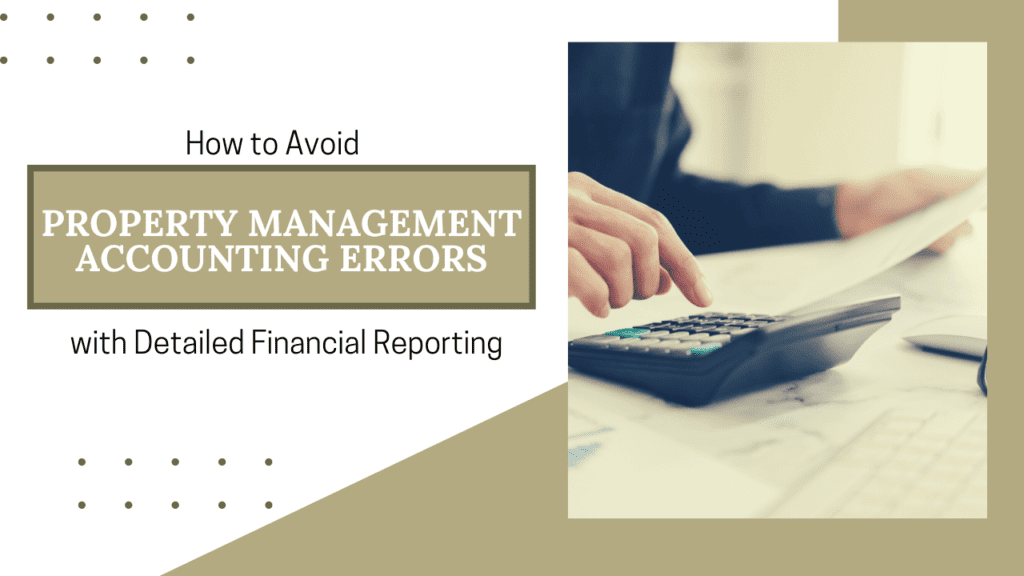
Accurate and detailed financial reporting is an important way to understand the health and profitability of your San Diego investment property. Good accounting also keeps you in compliance with IRS filing requirements.
Ideally, you can look at your income and expense statements and know exactly what you are earning and spending on each rental property in your portfolio. With reliable financial reporting, you can easily understand how well your rental property is doing or whether a shift in course is necessary.
Keeping careful track of your finances is also the best way to avoid accounting errors. A simple mistake can change your entire financial picture and lead you into some questionable decisions. Avoid those accounting errors by implementing a detailed procedure for financial reporting and bookkeeping.
As property managers in San Diego who manage financial reports and accounting statements for property owners and investors, we can tell you that good technology and expert accounting help are the best tools to protect yourself and your investments.
Technology will help you organize, streamline, and automate many of your accounting practices and financial reports. You’ll get more transparency, better accuracy, and a lot of detail when you use the right software and technology platforms.
Expert help is also essential, unless you’re an experienced accountant. It’s important that you work with a financial professional, especially if you’re not partnered with a San Diego property management company. If you do have a property manager, you can count on them to generate all the financial reports and accounting statements you need.
Here’s a brief list of what you’ll need to have a consistent and proactive financial reporting process in place.
Financial Reporting Starts with a Balance Sheet
The balance sheet is potentially the most essential part of your financial reporting. When correctly executed, a balance sheet will reflect a monthly snapshot of your finances as they pertain to your rental properties.
Your balance sheet will help you analyze:
- Assets
- Liabilities
- Equity
Use a balance sheet for your single property or your entire portfolio of rental homes. This is an excellent way to avoid errors because it provides a high level overview of your entire performance. If something doesn’t look right, you can dig a bit deeper to find out where the issue may be.
A balance sheet reflects the strengths in your investment portfolio as well as the particular challenges and opportunities that may be waiting for you to address. It will include:
- Debts such as mortgages and other loans
- Actual balances
- Security deposits
- Assets such as cash, land, buildings, appliances, furniture, etc.
Your balance sheet will show you how much equity you have in your property. Understanding this will not only prevent errors, it will help you make good investment decisions going forward.
Prepare an Income Statement with Financials
Also called a profit and loss statement, your income statement will reflect your San Diego rental property’s cash flow. Most owners will want to see it prepared on a monthly or quarterly basis. We also recommend you look at an annual income statement.
You will need to itemize every expense so you can compare what you’re spending to the goals and budgets that you established for the property. You’ll see what you’ve earned over a specific time period.
It’s called an income statement, but you’ll also have some line items that reflect what you’re spending. When you notice that the expenses are increasing or unexplained, you ought to investigate the cause. Maybe maintenance is being required more frequently or your pest control and landscaping contractors have gone up in price.
Such increases in expenses shows you why financial reporting is so important: it lets you catch some potential trouble spots in a single property or your entire portfolio. You can avoid expensive mistakes that you might make if you didn’t have a clear look on what you are earning and spending on each property.
San Diego Rental Properties and a General Ledger
The general ledger will assist you by keeping track of all individual transactions that are on your balance sheet and income statement.
In the general ledger, you have the freedom to add more description and detail. You can make notes and observations. The ledger allows you to create a detailed and accurate record of each transaction that pertains to your investment property. You’ll list them as a liability or an asset; a revenue item or an expense item. You’ll see your equity growing or diminishing.
Tracking Accounts Receivable and Payable
Many times, the rental property accounting errors that occur can be traced back to improper payments or receipts. You’ll need a good accounting of your accounts payable and receivable.
Accounts payable is a report that will show you all of the financial obligations and short-term debts for which your property is responsible. You’ll have a record of who is expecting payment and how much is due. You can automate these payments to avoid errors such as paying the wrong amount or making a late payment.
With an accounts payable report, you will stay ahead of your bills, protecting yourself from delinquency or additional late fees and charges.
The opposite of accounts payable is accounts receivable. On this report, you will find your rental income and any money you receive from your tenants. In addition to rent, this report will reflect deposits, pet fees, late fees, and any additional money that might be due to you. Use this report to track and follow up on late rental payments and delinquencies.
San Diego Tenant Rent Roll
 Finally, your financial reporting and accounting system should include your rent roll. This is typically a financial report that helps you plan for lease renewals, rental increases, and other future projections. You’ll use the information in your rent roll to make smart decisions about the future of your property. This is a clear look at your property’s financial position and what your tenants are paying to live in your property. You’ll use the rent roll to calculate your ROI.
Finally, your financial reporting and accounting system should include your rent roll. This is typically a financial report that helps you plan for lease renewals, rental increases, and other future projections. You’ll use the information in your rent roll to make smart decisions about the future of your property. This is a clear look at your property’s financial position and what your tenants are paying to live in your property. You’ll use the rent roll to calculate your ROI.
We can help you avoid the most common accounting errors. Contact us at San Diego Residential Property Management for additional information on managing your investment property.

